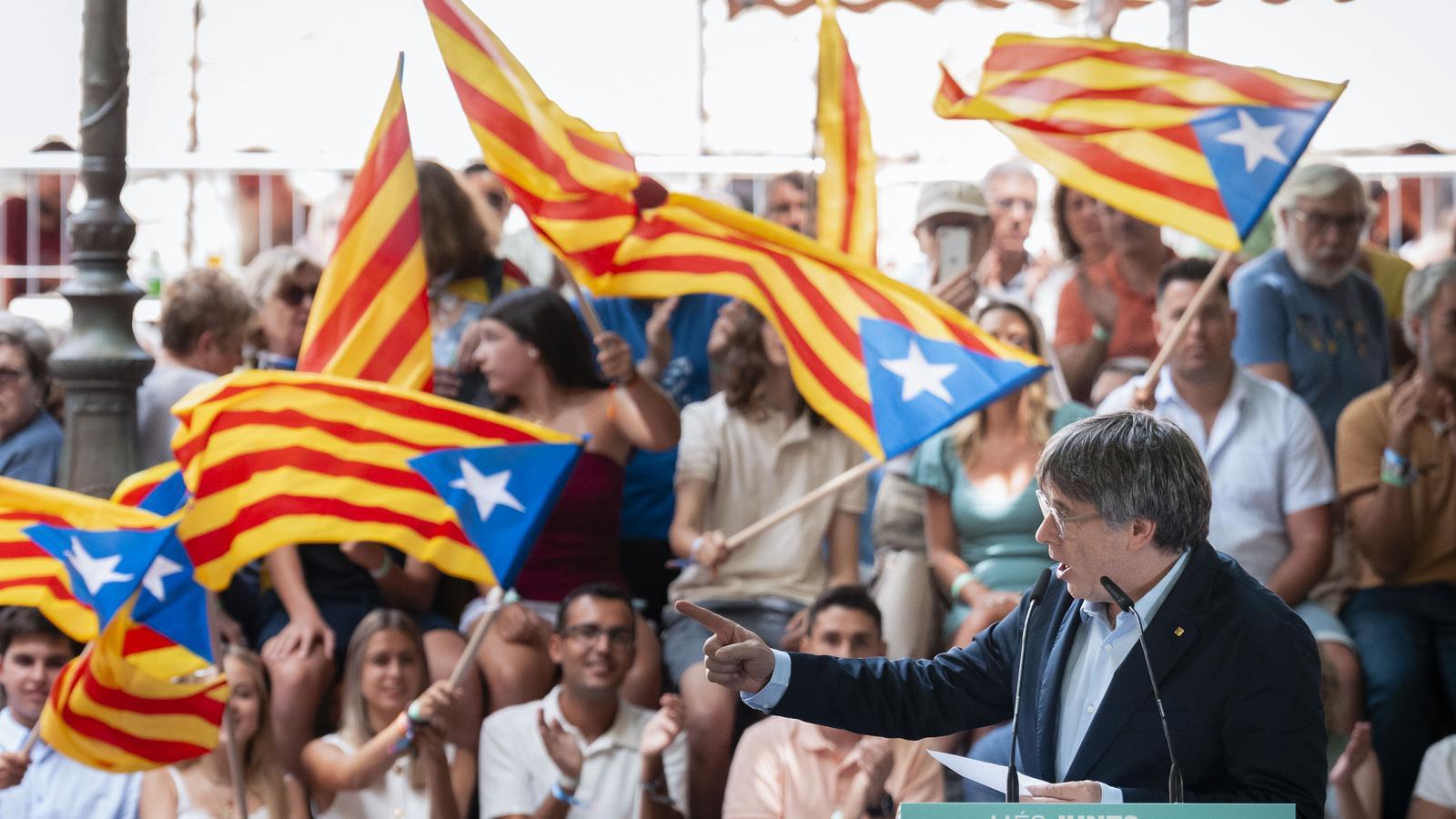Puigdemont warns those who give Junts per mort: "What a blast. We will continue"
The former president warns the PSOE that his vote "cannot be taken for granted."


Molló MeadowsThis Sunday, July 27, marked exactly one year since Junts held a show of force at the Arles and Palaldà Baths (Northern Catalonia), just days before Salvador Illa's inauguration. At the event, former President Carles Puigdemont pledged to to go to Parliament "peti quien pete" to be present at the plenary session. Just ten days later, he set foot in the Principality, but briefly: he escaped among hundreds of Mossos d'Esquadra officers and protesters surrounding Parliament, and returned to Waterloo. A year later, Puigdemont was again this Sunday in Northern Catalonia, this time in Prats de Molló, to celebrate the five years since its founding as a party. In a different context—Isla has been in government for a year now and they are in the opposition—but with the same problem: the former president of the Generalitat is still waiting to return, now with his eye on the autumn for the Constitutional Court to rule in his favor and for the amnesty to take effect.
Junts are aware that their pact to make Pedro Sánchez president has not yet borne the fruit they had hoped for. The amnesty law has been passed in Congress, yes, but the Supreme Court has not applied it to either Puigdemont or the pro-independence leaders; the official status of Catalan in the European Union is stalled, and the immigration powers for the Generalitat are blocked by Podemos in the Spanish parliament. For this reason, the former president wanted to send a double message to the 1,500 people who gathered in Prats de Molló to listen to him: one message coded as internal vindication, and another as a warning to those in Madrid. "We are proud of what we have done and the way we are doing it. To all those who buried us six times and who will bury us a seventh time tomorrow, we have to tell you to bomb you, we will continue, we will do our thing, the Catalan way," he declared. And he warned Pedro Sánchez: "Junts' vote cannot be taken for granted."
What Puigdemont said this Sunday, then, is that the tone will continue to be that of the last plenary session in Congress, in which Junts defeated at the last minute along with Podemos, PP and Vox the Spanish government's anti-blackout decree. If it doesn't serve the "interests of Catalonia," Puigdemont said, they won't be active in the plurinational majority. And how will they decide their vote? He put forward what he considers to be his "method," not only in the Congress of Deputies, but also in the Parliament and Barcelona City Council. "To decide the vote, we first ask ourselves if it is positive for Catalonia, if it respects our powers and identity, if our essential proposals have been accepted, and if it is useful on the path toward effective independence," the former president added.
For his part, the secretary general of Junts, Jordi Turull, has continued along the same lines and has also spoken out against "misunderstood pragmatism." "Catalonia needs Junts per Catalunya to save the nation and become its own state," he asserted, and hinted that they will have to make "difficult" decisions, without specifying which ones, in reference to their support for the Spanish government. "We will have to do it if we want to guarantee national progress. We are the pro-independence force that refuses to be lured by Madrid's siren call and always chooses Catalonia, neither one nor the other," Turull stated. In turn, the secretary of organization of Junts, Judith Toronjo, has attacked the government of Salvador Illa, whom she called "neither-nor": "Neither national ambition nor management." He also asserted that there will be no "political normalcy" until all exiles can return to the Principality.
The "architects of chaos"
Aside from his message in Madrid and internally, Puigdemont also sought to differentiate himself from his political rivals. From Esquerra (Republican Left), with whom he competes to extract the most benefits from the Spanish government, to the far-right Catalan Alliance, which is snagging a portion of his electorate. But also from the left of the PSOE, especially Podemos, with whom he recently clashed over their position on the transfer of immigration powers to the Generalitat (Catalan Government) following the coup. from an interview with Ione Belarra in the ARA.
Taking a swipe at Oriol Junqueras's party, Puigdemont criticized the fact that they "make deals out of hand" in their pacts with the PSOE (Spanish Socialist Workers' Party), while also accusing the Catalan Alliance and the left wing of the PSOE of proposing "populist" solutions. For example, he distanced himself from those who, in the face of immigration, defend "mass deportations" or advocate "doing away with landlords" to resolve housing problems. "In the face of the architects of chaos, we are the pawns of hope," he reaffirmed.
Puigdemont ended the day dancing sardanas with Junts supporters, to the rhythm of the Cobla de Girona, and taking photos with anyone who asked. "Today is a major festival," he proclaimed, to celebrate the fifth anniversary of his party's founding.
